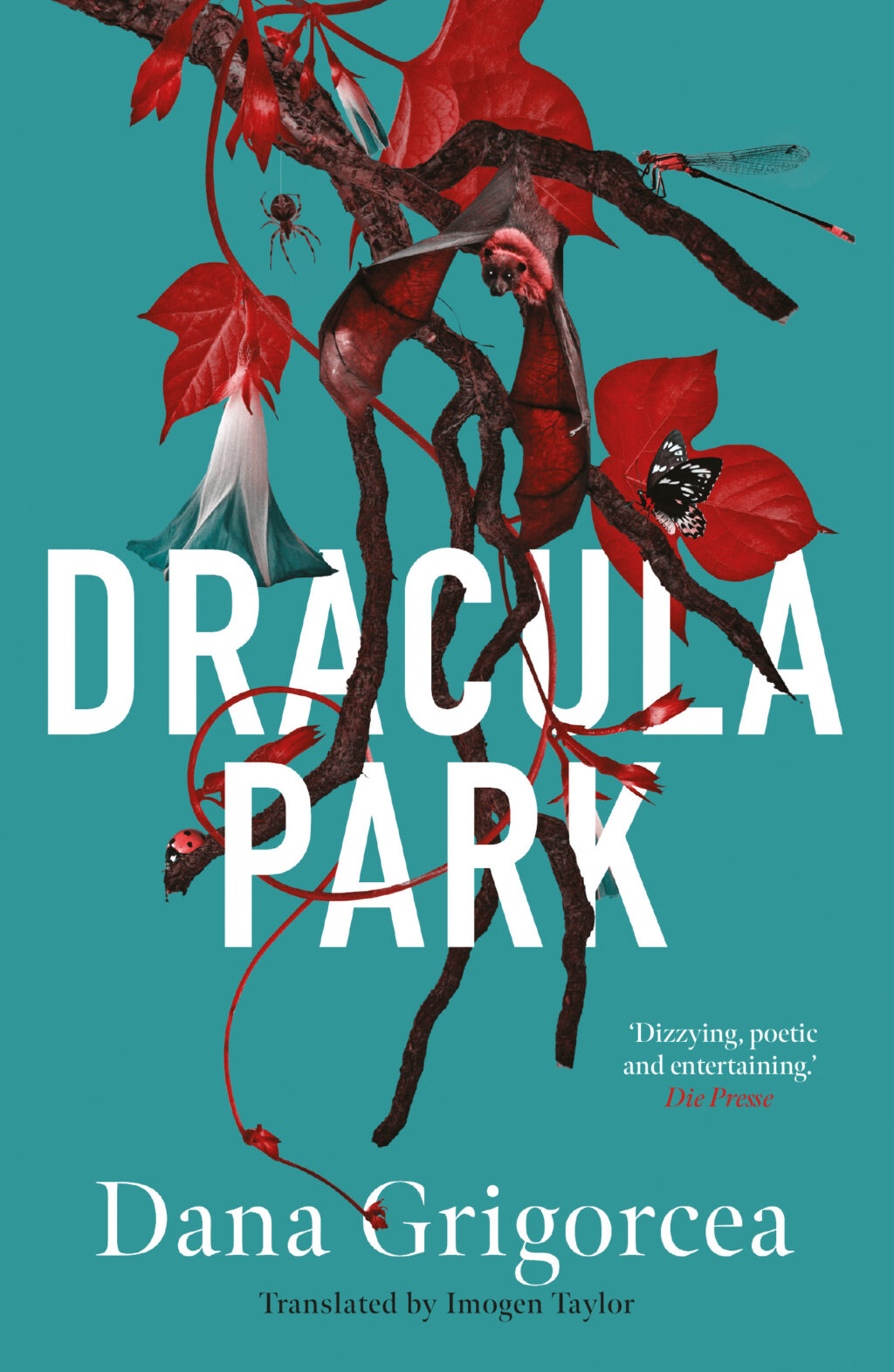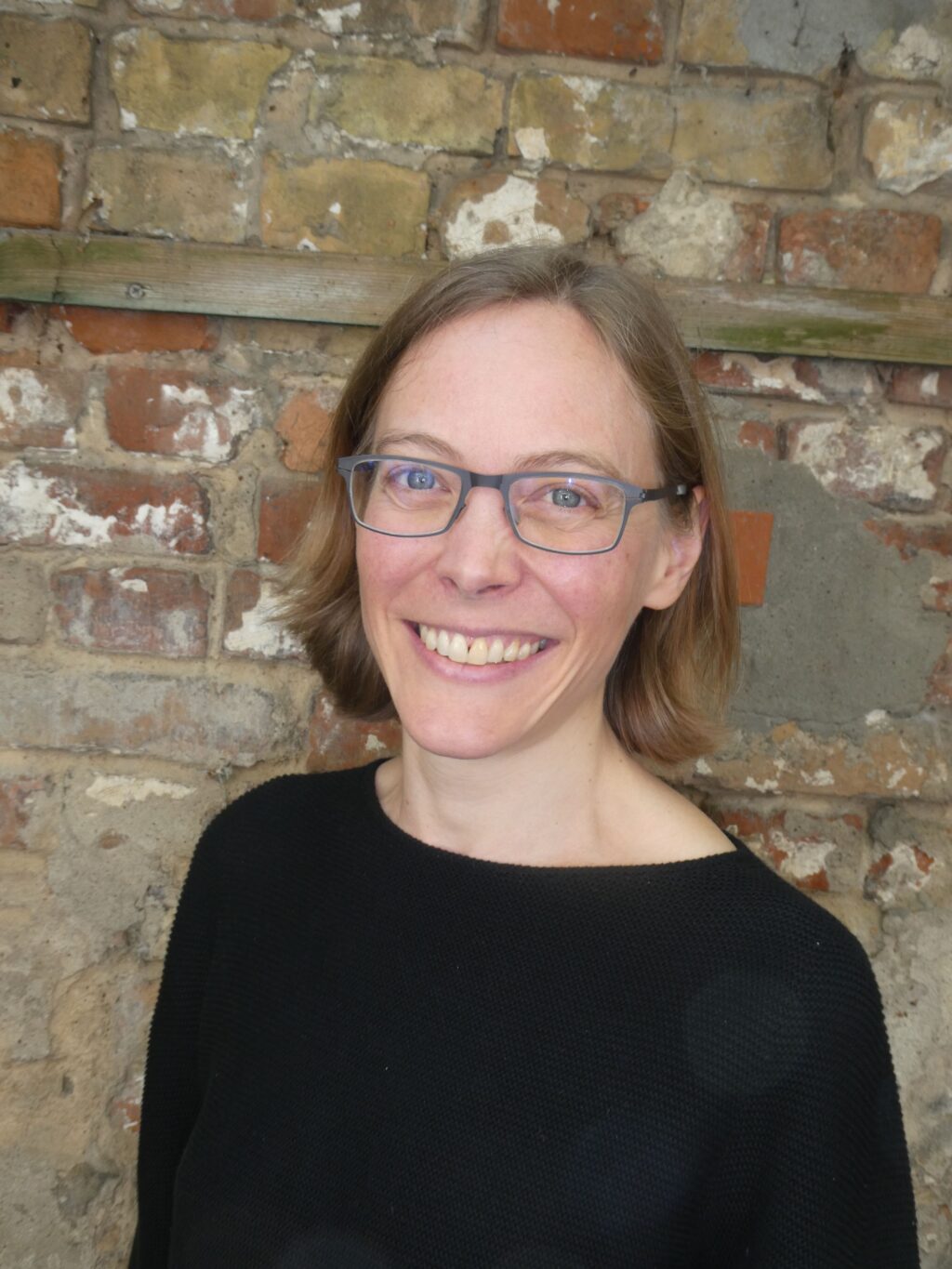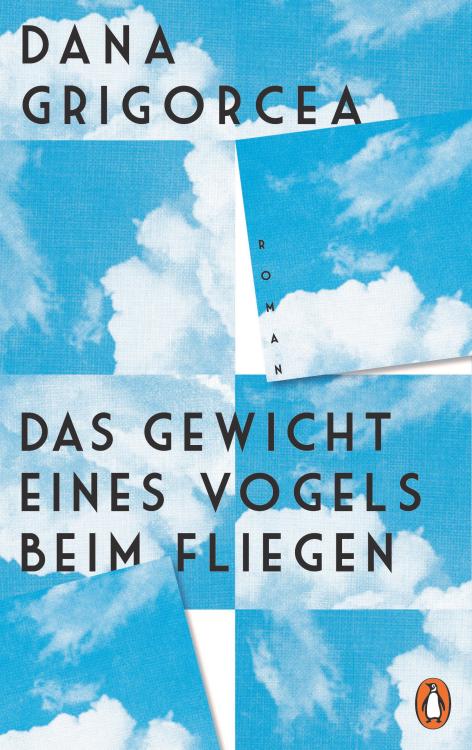Swiss-Romanian author, Dana Grigorcea, speaks to New Books in German about her prize-winning novel, Dracula Park, in Imogen Taylor’s English translation in 2023. Dana’s book The Weight of a Bird in Flight is also recommended for translation by NBG. Dana will be appearing at the Edge-Lit Festival in Derby in September 2024.
Sheridan Marshall: Can you tell us about how you came to be a writer?
Dana Grigorcea: I became a writer without my knowledge. A friend to whom I had lent a travel diary sent it to the largest literary magazine in Romania and they printed it in a series. I found out about it when I was called to pick up my author’s fee. The series had a glowing introduction by an author I adored. He wrote that I was a shining star in the firmament of Romanian literature. It very much intimidated me, because I was only about sixteen-years-old and still in school. I was worried that he might have been mocking me.
SM: Who are your most significant literary role models?
DG: Those who can tell an essential story in an entertaining way, a story that is far from being over when you finish reading it. From Homer, to Cervantes, Dickens, Thomas Mann, Bulgakov, Alice Munro, Olga Tokarczuk … everything is there.
SM: Your published work includes novels, novellas, essays, and children’s books. Which literary form do you most enjoy working in and why?
DG: I like novels best because they leave more space to build up an atmosphere. I can stay in those literary worlds for longer while I am writing.
SM: What was your inspiration for your third novel, Dracula Park?
DG: As a Romanian, the theme of Dracula was passed on to me almost at birth, through stories, myths and superstitions. But there were several triggering moments that led me to write the novel: a few years ago, the Romanian Minister of Tourism wanted to build a theme park called Dracula Park, a kind of gothic Disneyland for all the vampire fans who come to Romania. This proposal divided the population: some were in favour and bought shares for the company, others were very much opposed because it would have been necessary to clear an ancient forest, and it was a highly corrupt project. Even King Charles – then still Prince of Wales – got involved in the debate. He owns an estate in Transylvania, with organic gardens, and is keen to preserve the area. This gave me the idea to write a novel about corrupt politicians who build a kitsch vampire park and are then haunted by vampires themselves.

When we opened the tomb and I got on my hands and knees to pick up the few tiny bones of the eighteenth-century grandmother, the four iron lions in the corners of the coffin and her tiny shoes, probably shrunk, I knew there was more to this tomb than I could grasp at the time… There was a whole story in that grave.
Dana Grigorcea
Then there was another moment: when a member of my family died, I went down to one of our family vaults, with a small man with a huge hammer, to free the oldest grave. When we opened the tomb and I got on my hands and knees to pick up the few tiny bones of the eighteenth-century grandmother, the four iron lions in the corners of the coffin and her tiny shoes, probably shrunk, I knew there was more to this tomb than I could grasp at the time… There was a whole story in that grave.
SM: Dracula Park is such an intriguing novel, full of fascinating details about post-Ceaușescu Romanian culture. What was it like researching the book?
DG: I didn’t have to do a lot of research before writing. I have been researching these stories for years, following these topics, and they finally found their form. It was deeply satisfying to write this novel at last, because I noticed from the beginning that it miraculously gets to the heart of the whole history of Romania: the recent history, the history of the Communist dictatorship, but also the history before it and everything that is unprocessed and repeats itself. Dracula is the perfect motif for writing about Romania, and not only about Romania, by the way. It depicts those undead subjects that we thought had been buried a long time ago and relegated to the past, but who come out of their graves with hideous faces. The undead themes we find everywhere are nationalism, chauvinism, and the almost morbid desire for a strong hand, for a strict leader who puts things in order.
My ambition was to write the ultimate Dracula novel, to bring all the stories about Dracula together into an entertaining narrative. The book is therefore full of references to books and movies, although you don’t need to know the books and movies to feel included in the reading. It was important for me to include the historical figure of Vlad the Impaler, a prince from the Middle Ages, who inspired Bram Stoker to create the character of Dracula. He is celebrated as a hero in Romania to this day and has a remarkable biography, much closer to Dracula than Bram Stoker or Francis Ford Coppola would have suspected.
SM: Who is your favourite character in the novel?
DG: My favourite character is the narrator, because she develops in the most interesting ways.
SM: Will there be any more encounters with vampires in your future literary works?
DG: I don’t think so. I don’t want to repeat myself, or to run the risk of becoming a cliché.
SM: You are no stranger to literary prizes and nominations with your earlier novels, but in 2021 Die Nicht Sterben (the original German title of Dracula Park) was longlisted for the German Book Prize and won the Swiss Book Prize. What impact did this have on your literary life?
DG: I had about four literary events a week for three years. It was hard work, I had to get used to it. Then the book became school reading in Switzerland and I suddenly had a young audience that I hadn’t expected. I received lots of handwritten letters, which I hadn’t expected either, and I am increasingly invited to give speeches at graduation ceremonies, at book fairs, at the opening of the opera season. I had to acquire a formal wardrobe, to get out of my jeans and away from my comfortable life. I was recently knighted by the Romanian president for services to culture. And now with the translations of the book – especially with the French translation – I am on the road a lot. I used to write at home, now I write on trains and in station cafes. Actually, that’s nice too.
SM: Your work has been translated into ten languages. What does it mean to you to have your books published in different languages, and how does it affect your perception of your writing in German?
DG: My experience with the translated books strengthens my assumption that the great stories are universal. Beyond the small folklorisms, which in turn are only decoration, we all understand each other. When I write, I have images in front of me, scenes. And I seek linguistic access to these scenes before they evaporate like dreams after waking up.
I have a particularly close relationship with translation because I live in Switzerland as a native Romanian and write in German. There are words that, depending on the culture, have a different reverberation chamber. A good translator takes this into account. And it is very important that the rhythm of the sentences and paragraphs is right. I structure my books like symphonies. I am lucky that all my translators are avid readers, smart and meticulous, with a good sense of rhythm. The English translator, Imogen Taylor, is absolutely brilliant. I have set up an open platform for all my translators, where we exchange ideas. The conversations we have about translatability inspire me immensely as an author.
SM: Imogen Taylor translated Dracula Park in 2023. What involvement did you have with the translation process for the English-language version of the book?
DG: Imogen sent me a few questions first. They were so detailed that I knew right away that I had found the right translator. Then Imogen also discovered an error in the original German edition. She had received the paperback edition after the book had previously been published in three revised editions and she still managed to discover an error. It said something like ‘to her left and then to her left’, instead of ‘to her right’. In the heat of the action described, no one had noticed this before, except Imogen!
When I received the English book, I read a few pages aloud to myself. The rhythm was right. What a joy!

Imogen Taylor, translator of the English edition of Dracula Park.
SM: In your most recent novel, Das Gewicht Eines Vogels Beim Fliegen / ‘The Weight of a Bird in Flight’ – recommended by New Books in German here – you explore the role and purpose of art in our lives. How did the unusual story of sculptor, Constantin Avis, come into being in this novel?

DG: The Romanian sculptor Constantin Brancusi inspired me to create the figure of Constantin Avis. For him, there were no borders and I wanted to write about that, in our world full of borders. He travelled on foot from Romania to Paris. And when the American customs authorities refused to let his artwork ‘Bird in Space’ cross the border duty-free, as an art object, and instead declared it as a commodity, he took the American state to court. There was a sensational trial about this ‘Bird in Space’ sculpture in the roaring twenties, covering the kind of debates about art that continue to this day. And when Constantin won the case, the American newspapers ran the headline ‘It’s a bird!’ This exclamation made me think of the exclamations on the birth of a child: ‘It’s a boy!’ or ‘It’s a girl!’ And that’s how I came up with the character of Dora Marcu, a female writer with a child travelling to Liguria to write her novel about the unattached Constantin. Everything Dora sees and experiences in present-day Liguria is incorporated into her novel, set in New York in the 1920s, where it has its own plausibility. But what she has written will catch up with her in the present.
SM: Can you tell us anything about what you are working on at the moment?
DG: At the moment I am travelling a lot on reading trips, and I am just taking notes in the notebooks I have with me. I have already outlined the next two novels and am amusing myself with all sorts of scenes that come to mind.
SM: At New Books in German, we are always grateful for insights into the contemporary German-language literary scene. Can you tell us about the current authors whose work you most admire?

DG: I most admire my husband, the writer Perikles Monioudis, but I could be suspected of being biased. In any case, we inspire each other with our books. For example, his novel Frederick tells the story of Fred Astair from the perspective of the devil, who wants to stop him from dancing and shows him the futility of art. But Frederick dances on and on. I love this book! Or he has a novel called Land, a very sensual book about a journey around the Mediterranean. J.M. Coetzee liked this book so much because it is cleverly told, and the moods of the Mediterranean countries are very finely interwoven.
SM: We featured Land in New Books in German back in 2007, and our review is available here. What are your literary ambitions for the next few years?
DG: My future ambition is to get to know my English-language readers better. Before the pandemic, I did a big reading trip to America and a reading trip to India. That was a great appetiser!
SM: Thank you so much for taking part in this interview, Dana!

Interview supported by the Embassy of Switzerland in the UK
Author photo credit – Lea-Meienberg
For Dracula Park on the publisher’s website, visit here
For our original recommendation of the book (may contain spoilers!), click here
To read our interview with Dracula Park translator Imogen Taylor click here
For our recommendation of The Weight of a Bird in Flight, with translation funding guaranteed by Pro Helvetia, click here
For information on the Edge Lit Festival, and to by ticket, visit here

Swiss-Romanian writer Dana Grigorcea was born in Bucharest in 1979 and has a degree in German and Dutch studies. She has won worldwide acclaim for her novels and short stories, including An Instinctive Feeling of Innocence (published in translation in 2019) and ‘The Lady with the Maghrebi Dog’. Her novel Dracula Park (published in translation in 2023) won the 2022 Swiss Book Prize and was longlisted for the 2021 German Book Prize. Dana Grigorcea is also the winner of the prestigious 2015 Ingeborg Bachmann/3sat Award. Her books have been translated into numerous languages.

Sheridan Marshall is a freelance editor and translator. She works with New Books in German as Editorial Consultant.








